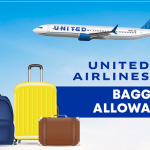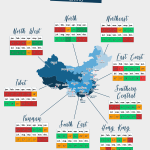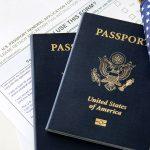Baggage Allowance for Entry & Exit China
Various airlines have slight variations in their regulations regarding baggage allowance, with differences between domestic and international flights. The following information outlines the general conditions of baggage allowance in China. Travelers are advised to review detailed information on the official websites of the airlines.
There are two types of baggage: carry-on baggage and checked baggage. Carry-on baggage refers to the items passengers are permitted to bring onto the airplane. For additional baggage or items prohibited in carry-on luggage, passengers can check these items with the carrier and retrieve them at their destination. These items are known as checked baggage.Check What to Pack for China Travel>>
Tips:For a seamless and efficient boarding experience when traveling from Hong Kong to mainland China via high-speed train, we recommend reviewing the detailed China Train Baggage Allowance guidelines. This will ensure that you are well-prepared and informed about the luggage regulations, allowing you to board smoothly and without any issues.
Carry-on Baggage
Size
Domestic Flight: In general, the total weight of the baggage should not exceed 5kg, and the combined length, width, and height should not exceed 115cm (45in). First-class passengers are permitted to carry two pieces of carry-on baggage, while business class and economy class passengers are limited to one piece of carry-on baggage.
International Flight:In general, the total weight of carry-on baggage must not exceed 7kg, and the combined length, width, and height should not exceed 115cm (45in). Please note that on the American-Canada route, passengers are only permitted to bring one piece of carry-on baggage.
Note:Each airline may have varying requirements, so it is important to verify the specific details on the airline’s website. Any item that exceeds the weight, number, or size limitations will be considered as checked baggage.
Regulation for Lithium Battery
Passengers are allowed to carry spare batteries for mobile phones, laptops, cameras, and other personal equipment. However, these spare batteries must be placed in carry-on baggage only. Lithium batteries for electronic devices such as mobile phones, laptops, and cameras must also be placed in carry-on baggage during the flight. It is important to ensure that all equipment with lithium batteries is powered off during the flight and that the batteries are properly protected and packed independently to prevent combustion or explosion due to friction or short circuit.
For lithium batteries with a rated energy lower than 100Wh, each passenger can bring a maximum of 2 pieces without the need to declare them to the airline. If the rated energy of the lithium battery is between 100Wh and 160Wh, passengers can still bring a maximum of 2 pieces but must declare the batteries to the airline and receive approval before boarding.
For lithium batteries with a rated energy equal to or higher than 160Wh, passengers must declare the batteries to the airline and inquire about freight services. It is crucial to follow these guidelines to ensure the safety of all passengers and crew during the flight.
Note:Rated Energy (wh) = Battery Capacity (Ah) × Normal Voltage (V)
Regulation for Liquids
1. Liquids, gels, and aerosols must be stored in containers with a maximum capacity of 100ml. Containers larger than 100ml are not permitted in carry-on baggage and must be placed in checked baggage.
2. All liquid containers must be placed in a transparent plastic bag with a maximum capacity of 1L. Each passenger is allowed one plastic bag, any excess must be transferred to checked baggage.
3. Liquid bags will be inspected separately at the security checkpoint. Passengers carrying infant formula, milk, or liquid medications for diabetes or other medical conditions must present certification to security staff. These items must also pass through security in containers of 100ml or less, sealed in a transparent plastic bag.
4. Liquids purchased in the isolated area of the airport terminal are allowed to be brought onto the plane.
Checked Baggage
Free Checked Size
Domestic Flight:Typically, first-class passengers purchasing both adult and children tickets are entitled to 40kg of complimentary checked baggage. Business-class passengers are allowed 30kg of free checked baggage, while economy-class passengers are limited to 20kg of complimentary checked baggage.
International Flight:Typically, passengers in economy class are allowed to bring 20kg of checked baggage for free. However, passengers with a student passport are entitled to bring 30kg of checked baggage at no additional cost. For those traveling in business class, the allowance is 30kg, and for first class, it is 40kg.
When flying to countries in the Americas, each passenger is permitted to bring two pieces of checked baggage. The weight limit for each piece of baggage is 32kg for first class and business class, and 23kg for economy class. Additionally, the total dimensions of each piece of baggage should not exceed 158cm when adding the length, width, and height.
If a passenger’s baggage exceeds the free baggage allowance, they will be required to pay for the excess weight.
Note:
1. When booking a ticket with low-cost airlines such as AirAsia, it is important to note that checked baggage services are not complimentary. Passengers will be required to pay for checked baggage, as regulations may vary between airlines.
2. Typically, infant passengers do not have a free baggage allowance, although parents are permitted to bring one stroller at no additional cost.
3. Travelers are allowed to bring their pet dog or cat on the plane, provided they have the necessary health certificate for the animal. Pets will be placed in the cargo space, so it is important to ensure they are suitable for this environment. The cages for the pets must be well-ventilated and securely fastened to prevent any escapes.
Unsuitable Items for Checked Baggage
The following items are not suitable for checked baggage and should be placed in carry-on baggage instead: fragile or delicate items, perishable goods, cash and valuable tickets, jewelry, precious metals such as gold and silver and their products, antique calligraphy and paintings, computers and personal electronic devices, samples and other valuables, spare lithium batteries, important documents and materials, travel documents, medical certificates, X-ray images, and prescription medications that need to be taken regularly.
Smart Ways to Deal with Excess Baggage
Excess baggage fees can sometimes be exorbitant, surpassing the value of the baggage itself. Therefore, understanding how to effectively manage excess baggage is crucial for travelers looking to save money.
When selecting a flight, passengers should consider not only the flight time and ticket price, but also the potential charges for excess baggage. For international flights, it is important to take into account exchange rates, as foreign and Chinese airlines may use different currencies for baggage fees.
Joining the membership program of an airline can provide travelers with benefits such as increased free baggage allowances. Members often have the privilege of bringing an additional free bag compared to non-members.
To save money on excess baggage fees, passengers should book their baggage limit online in advance to receive discounts from the airline. In some cases, travelers can enjoy up to a 20% discount by booking ahead.
If the cost of excess baggage exceeds the value of the baggage itself, it may be more cost-effective to mail the baggage from the nearest post office instead.
Lastly, staying informed about the latest promotions offered by airlines can lead to savings on excess baggage fees. Airlines occasionally enhance their free baggage allowances for specific groups, and being aware of these promotions in advance through the airline’s website can result in significant cost savings.
Prohibition and Limitation of the Baggage
Articles Prohibited to Transport
Prohibited items on flights in China include dangerous articles such as explosives, gas (flammable, toxic, nonflammable toxic), flammable liquids, flammable solids, spontaneously combustible substances, substances that release flammable gas in contact with water, oxidizing agents, organic peroxides, toxic substances, infectious substances, radioactive substances, corrosive substances, magnetic substances, and other regulated dangerous substances.
Additionally, lighters and matches are also not allowed on planes in China.
Furthermore, guns (including imitation guns, gun-shaped lighters, attacking weapons, and firearms for sports), ammunition, military and police firearms, and controlled knives are strictly prohibited.
Living animals are generally not allowed on flights, except for small animals and service animals that meet specific requirements.
Articles Limited to Transport
1. Electric appliances and precise instruments must be checked as goods, as checking them as baggage will not include their weight in the free baggage allowance. Additionally, they must be properly packed to ensure their safety during transport.
2. Sports equipment, including sports guns and ammunition, are allowed for travel.
3. Dry ice, alcoholic drinks, smoking sets, medicines, and cosmetics necessary for passengers during their journey are permitted.
4. Diplomatic pouches and confidential documents are also allowed for transport.
5. Edged tools and blunt objects, with the exception of controlled knives such as kitchen knives, fruit knives, craft knives, scissors, steel files, axes, hammers, etc., must be placed in checked baggage.
6. Small animals and service dogs that meet the necessary requirements are permitted for travel.
7. Folding wheelchairs or electronic powered wheelchairs used by passengers during travel are allowed.
8. Liquids carried by passengers are permitted.
9. Items that are not suitable for transport in the cargo hold of the aircraft, such as delicate instruments, and do not meet relevant regulations regarding weight and size, must be taken into the passenger cabin as CBBG. These items will incur an additional charge and must be kept by the passengers themselves.





















 Online | Privacy policy
Online | Privacy policy